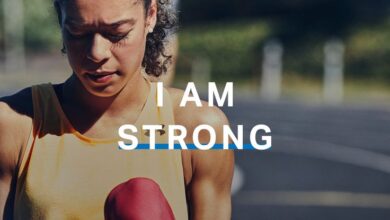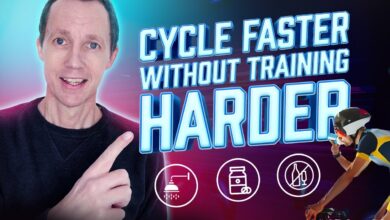
Hydrate Right: Before, During, and After Your Workout
The right way to hydrate before during and after a workout – Hydrate Right: Before, During, and After Your Workout – We all know that water is essential for life, but did you know that staying properly hydrated is crucial for maximizing your workout performance and preventing injuries? From understanding the science behind hydration to mastering the art of replenishing your body’s fluids, this guide will equip you with the knowledge and tools to make hydration a cornerstone of your fitness journey.
Whether you’re a seasoned athlete or a fitness enthusiast just starting out, understanding how to hydrate effectively can significantly impact your training progress. This comprehensive guide delves into the science of hydration, exploring the importance of water intake before, during, and after exercise.
We’ll uncover the secrets to optimizing your fluid intake, debunking common hydration myths, and providing practical tips to make staying hydrated a breeze.
Hydration Before Workout

Proper hydration before your workout is crucial for optimal performance and preventing dehydration-related issues. Drinking enough fluids before you start exercising helps your body function efficiently and allows you to train harder for longer.
Staying hydrated is crucial for optimal workout performance, and it’s not just about chugging water before you hit the gym. You need to strategically sip throughout your session, especially if you’re lifting weights, which can help you burn fat.
Read more about can lifting weights help you lose fat to learn how it can be a powerful tool for your fitness goals. After your workout, replenish your fluids with electrolytes to help your body recover and prepare for your next session.
Water Intake 2-3 Hours Before Exercise
It is generally recommended to consume 17-20 ounces of water 2-3 hours before your workout. This allows your body ample time to absorb the fluids and prevents you from feeling bloated during your exercise session. The exact amount of water you need may vary depending on factors such as your body weight, the intensity and duration of your workout, and the climate.
Benefits of Electrolyte-Rich Beverages Before Workout
Electrolyte-rich beverages can be beneficial before a workout, especially for intense or prolonged exercise sessions. Electrolytes are minerals like sodium, potassium, and magnesium that are lost through sweat during exercise. Replenishing these electrolytes helps maintain fluid balance, prevents muscle cramps, and supports overall performance.
Drinking Water or Sports Drinks Before Workout
Both water and sports drinks can be effective pre-workout hydration options.
Staying hydrated is crucial for a successful workout, so make sure you sip water before, during, and after your session. After your workout, you might want to listen to some upbeat music to get your mood going, but did you know that your post workout music has a big impact on your recovery ?
It can actually help you relax and recover faster! So, grab a bottle of water, put on your favorite tunes, and let your body recover.
Water
Pros
Staying hydrated is key for any workout, whether it’s a leisurely walk or a vigorous run. Before you hit the pavement, make sure to drink plenty of water. During your workout, sip on water or a sports drink to replenish electrolytes.
And afterwards, refuel with water and a balanced meal. Of course, choosing the right footwear is just as important. If you’re wondering about the difference between walking versus running shoes , it’s all about the support and cushioning you need for your specific activity.
Once you’ve got your shoes sorted, you’ll be well on your way to a safe and enjoyable workout. Don’t forget to keep hydrating throughout the day!
Cons Water does not contain electrolytes, so it may not be ideal for intense or prolonged workouts where electrolyte loss is significant.
Sports Drinks
Pros Sports drinks contain electrolytes, which can help replenish those lost through sweat. They also provide carbohydrates, which can fuel your workout.
Cons Sports drinks often contain high amounts of sugar, which can be detrimental to your health if consumed in excess. They can also be expensive compared to water.
Hydration After Workout

You’ve finished your workout, feeling the burn and the satisfaction of a job well done. But your work isn’t over yet. Just like you refueled your body with food before your workout, you need to replenish the fluids you lost during your exercise session.
Hydration after a workout is crucial for recovery and overall well-being. Your body works hard during exercise, sweating to regulate its temperature and maintain performance. This sweat loss depletes your body’s fluids, and if not replenished, can lead to dehydration and hinder your recovery process.
Replenishing Lost Fluids, The right way to hydrate before during and after a workout
Replenishing the fluids lost during exercise is vital for several reasons. First, it helps your body recover from the stress of exercise. Dehydration can lead to muscle cramps, fatigue, and reduced performance. Second, proper hydration helps regulate your body temperature, preventing overheating.
Finally, adequate hydration supports your body’s ability to transport nutrients and remove waste products.
Choosing the Right Post-Workout Recovery Beverage
Choosing the right post-workout recovery beverage can significantly enhance your recovery process. Here are some factors to consider:
Electrolyte Replacement
Electrolytes, such as sodium, potassium, and magnesium, are lost through sweat. Replacing these electrolytes is crucial for maintaining proper hydration and muscle function. Sports drinks are formulated to provide electrolytes, but you can also choose from electrolyte-rich foods like bananas, coconut water, and watermelon.
Carbohydrate Intake
Carbohydrates are essential for muscle recovery and replenishing energy stores. Consider a beverage that provides a moderate amount of carbohydrates, like a sports drink or a fruit smoothie.
Protein Intake
Protein is crucial for muscle repair and growth. While you don’t need to consume a protein shake immediately after your workout, adding a small amount of protein to your recovery beverage can be beneficial.
Water
Plain water is always a great choice for post-workout hydration. It’s simple, readily available, and cost-effective. If you’re looking for a more flavorful option, try adding a slice of lemon or lime to your water.
Signs of Dehydration After Exercise
Recognizing the signs of dehydration after exercise is important for addressing the issue promptly. Here are some common symptoms:
- Excessive thirst
- Dry mouth
- Dark urine
- Headache
- Fatigue
- Muscle cramps
- Dizziness
If you experience any of these symptoms, it’s essential to rehydrate immediately by drinking water or an electrolyte-rich beverage.
Addressing Dehydration
If you suspect you’re dehydrated after exercise, it’s crucial to take immediate action. Here’s how to address the issue:
Drink Water
Start by drinking water to replenish lost fluids. Aim to drink at least 16 ounces of water within the first hour after your workout.
Electrolyte Replacement
Consider consuming an electrolyte-rich beverage or food to replace lost electrolytes. Sports drinks, coconut water, and bananas are good options.
Rest
Allow your body to recover by resting. Avoid strenuous activities until you feel fully hydrated.
Seek Medical Attention
If your dehydration symptoms are severe or persist, consult a doctor. Dehydration can be serious, especially for athletes and individuals with underlying health conditions.
Final Thoughts: The Right Way To Hydrate Before During And After A Workout

Staying hydrated is a simple yet powerful way to enhance your workouts and support your overall health. By following the guidelines Artikeld in this guide, you can ensure that your body is properly fueled and ready to perform at its best.
Remember, consistent hydration is key to unlocking your full athletic potential and enjoying a fulfilling fitness journey. So, make hydration a priority and reap the rewards of a well-hydrated body!






